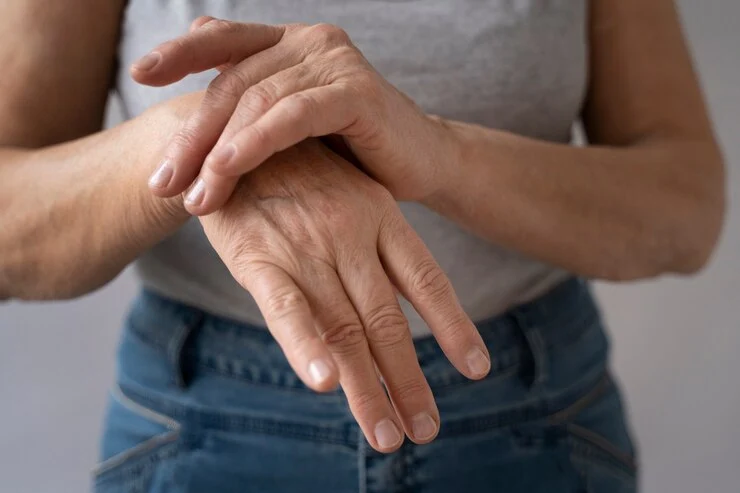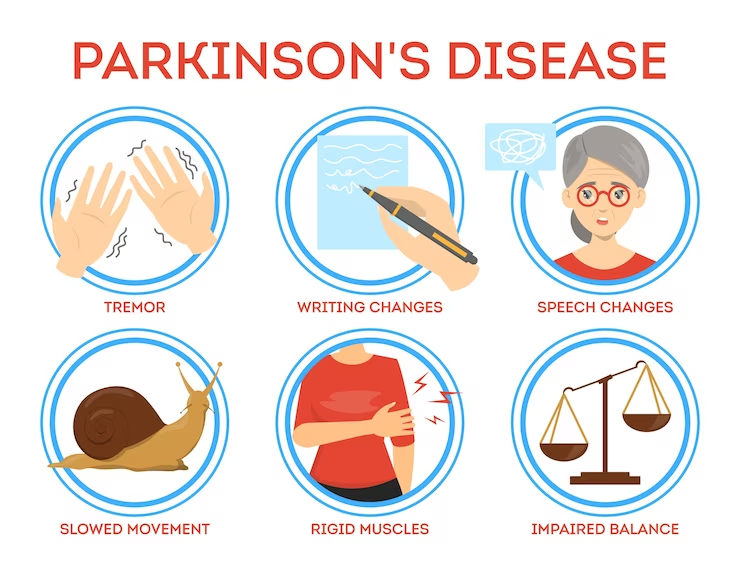Parkinson’s disease (PD) is a progressive neurodegenerative condition of the central nervous system that mainly affects the motor functions of an individual. The symptoms of Parkinson’s disease appear gradually over time. Its early signs may be barely noticeable – as it causes minute changes in the locomotive functions of an individual. Parkinsonism often develops around the age of 50, but it can incapacitate young adults too. Scientists and researchers are still in the race to find a cure for this disease. Let’s explore the role of Ayurveda in enhancing the quality of life when affected by Parkinson’s Disease.

Signs & Symptoms of Parkinson’s Disease
Parkinsonism initially appears on a subtle note. It could be a barely noticeable tremor in one hand or soft and slow speech. Decreased body movements and natural swinging of arms when walking may accompany. Sometimes, there could be inadequate facial expressions and tiny, cramped handwriting.

As the disease progress, it develops –
- Resting Tremor
- Bradykinesia ( Slowed Movements )
- Impaired posture
- Loss of balance
- Slurred, hesitated speech and
- Inability to perform automatic/unconscious functions like blinking or smiling
The above makes daily life difficult, leading to dependency. The inability to sleep, think, eat, speak, smell, and make decisions is more intense as the disease advances.
Are the symptoms just physical?
A diagnosis like that of Parkinson’s triggers stress and anxiety leading to a disturbance in emotional well-being. The symptoms of this disease that cause disability to perform daily functions may also lead to developing signs of depression.
Also, drugs (carbidopa-levodopa) prescribed for the management of this disease accompany side effects that exhibit symptoms like – hallucinations, confusion, nervousness, nightmares and sometimes even suicidal tendencies.
What causes Parkinson’s Disease?
Although the exact cause of this disease is unknown, several factors appear to play a role. A few identified risk factors include hereditary and exposure to pesticides. But experts identify the disease as ‘idiopathic’ – which in Greek means – ‘disease on its own’.
In this neuro-degenerative condition, the brain cells eventually start to malfunction and degenerate, affecting dopamine secretion in the brain. The mobility issue accompanying this malady is the consequence of this deficiency.
What does Ayurveda have to Offer…?
Ayurveda has an integrated approach when addressing any disease. Ayurvedic Treatment for Parkinson’s Disease focuses on the prevention and treatment of illness by rewiring and establishing harmony between the mind, body, and forces of nature.
Numerous studies and clinical trials have acknowledged the effectiveness of Ayurvedic medicines and cleansing procedures (Panchakarma Therapies) in the palliative care of PD.
Ayurvedic literature addresses Parkinsonism as Kampavata – a disorder caused by improper functioning of the Vata dosha. Severe Vata vitiation dries up cells (here, the ones in the brain)- causing postural instability, tremors, weak digestion, indigestion, and toxin buildup at the cellular level. These factors create an environment favorable for the disease manifestation.
Ayurvedic treatment for Parkinson’s disease aims to eliminate these toxins and rejuvenate the nervous system. Correcting and strengthening the digestive fire also play a crucial role.
Experts in the field use a combination of –
-
- Snehapana – systematically regulated internal administration of lipids
- Shodhana Chikitsa – bio-cleansing therapies
- Basti – medicated enemas
- Shirovasti – oil pooling on the head
- Nasyam – medicated nasal drops and
- Internal administration of specific herbal nerve tonics (Kashayam).
Medications that contain herbs like Kapikachu (Mucuna pruriens), Ashwagandha (Withania somnifera), Bala (Sida cordifolia) and Brahmi (Bacopa monnieri) are proven effective in PD.
An integrated approach to rehabilitation using physiotherapy and principles of nutritional medicine enhances the quality of life of a person affected with PD. If methodically followed up, Ayurveda – with its herbal formulations and therapeutic techniques, can strengthen and support the management of Parkinson’s disease and improve clinical results.
What RAHA has to offer in managing the symptoms of Parkinson’s Disease?
Raha Ayurveda’s Integrated Rehabilitation programme for Parkinson’s Disease incorporates Ayurveda, Physiotherapy, Psychology, Yoga and Nutritional Medicine. Our holistic treatment plans are customized to fit an individual – considering the state of the disease and its progression.
We offer unique herbal combinations for whole-body detoxification – yielding a rejuvenated body with improved blood circulation, proper digestion and refinement in nervous functions. To restore the functionality of the nervous system, the doctor advises a few lifestyle changes with a healthy diet and an exercise routine.
Talk to our experts today!
Leave a Reply